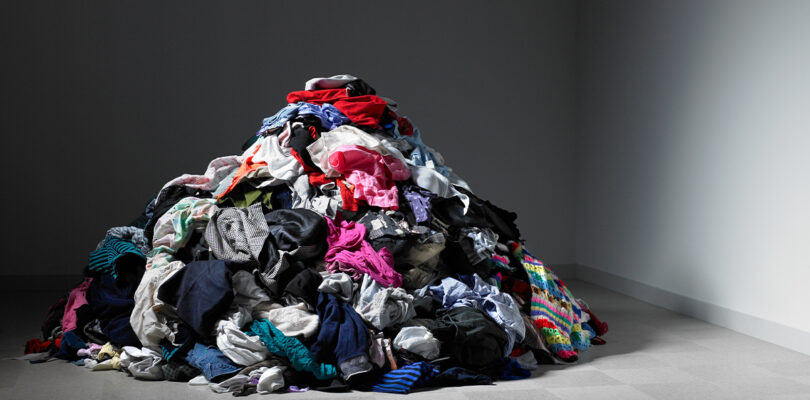Garment workers cut cloth to pattern sizes at a clothing factory in Faisalabad, Punjab, Pakistan, March 3, 2020 (Photo by Adam Cohn) Creative Commons license via Flickr
BONN, Germany, May 10, 2021 (Maximpact.com News) – Competitive fashion industry executives from throughout the world convened by the UN Climate Change agency have reached a consensus. They agree that a concerted recycling effort across the sector could cut waste, reduce greenhouse gas emissions and put the fashion industry on track to achieve the goals of the Paris Agreement and the 2030 Sustainable Development Goals.
The fashion executives are challenging all textile and apparel brands to commit to replacing their use of virgin polyester, sourced from nature, with recycled polyester to shift global volume of recycled polyester (rPET) from the current average of 14 percent up to 45 percent by 2025.
Chanel polyester blouse white short-sleeve preowned for sale on eBay, 2021 (Photo courtesy vegas_fashionista via eBay) Posted for media use
The 2025 Recycled Polyester Challenge has already attracted 85 textile and apparel companies, including names known worldwide such as: adidas, Banana Republic, Burbury, H&M Group, J.Crew, Levi Strauss, Lululemon, Stella McCartney and Target.
The global nonprofit Textile Exchange and the UN Fashion Industry Charter for Climate Action provide the foundation for the 2025 Recycled Polyester Challenge.
Under the 2015 Paris Agreement, the 196 nations and regional blocs agreed to limit global average temperature rise to as close as possible to 1.5°Celsius above pre-industrial levels. This level of ambition will require steep reductions in greenhouse gas emissions across the fashion industry, which needs to work with raw materials which have the lowest possible carbon footprint.
Polyester makes up about half of the total fibre market volume produced globally, and the apparel industry accounts for roughly 32 million tons of the 57 million tons of polyester used worldwide each year.
Currently, only 14 percent of this comes from recycled inputs – mostly from post-consumer PET drinks bottles, according to the Textile Exchange Preferred Fiber & Materials Market Report 2020.
Polyester is the most widely used fiber in the apparel industry, accounting for around 52 percent of the total volume of fibers produced globally. Cotton is the most used natural fibre and the second most used fibre overall in the textile sector.
With more than 350 members who represent brands, retailers, and suppliers, the Textile Exchange manages and promotes a suite of industry standards. It also collects and publishes critical industry data and insights that help brands and retailers to measure, manage and track their use of preferred fiber and materials.
On April 26, a group of experts brought together by the UN Fashion Industry Charter for Climate Action issued a new report that can help the fashion industry transition towards sustainable, low carbon production by detailing how cotton and polyester can be sustainably sourced.
The report, “Identifying Low Carbon Sources of Cotton and Polyester Fibres”
was developed to provide insights into the implications
of various cotton farming practices and PET production pathways, across diverse geographies.
The report is also expected to provide a foundation for stakeholders to define “a harmonized approach for climate accounting of cotton and polyester.”
Claire Bergkamp, chief operating officer at Textile Exchange, and co-chair of the Challenge’s Raw Materials Working Group, explained, “This report points to crucial actions that should be taken now and to a clear need to improve how we measure and report raw material impacts. For the industry to stay within the 1.5°C pathway, we need to start at the beginning of the supply chain with the transformation of raw materials.”
The report highlights strategies available to organizations to reduce climate impacts from polyester production, such as scaling up the use of recycling technology providers, improving recycling infrastructure, and investing in automated sorting technologies and alternative feedstocks.
Karla Magruder, founder at Accelerating Circularity
The survey is the largest peer-to-peer comparison initiative in the textiles industry. “Participating companies tell us that just the act of completing the survey provides a valuable roadmap for improvement,” Textile Exchange said in a statement.
All information entered into Textile Exchange’s Corporate Fiber & Materials Benchmark survey is entirely anonymous and is aggregated across all annual report participants to show progress. Textile Exchange promises that, “Company information will never be singled out and published without a company’s explicit request or consent.”
With 85 brands and suppliers already committed, the 2025 Recycled Polyester Challenge has quickly become an active catalyst for change in the apparel and textile industry.
“Helly Hansen is committed to reducing its dependency on fossil fuels and its overall environmental footprint,” said Rebecca Johansson, sustainability and R&D Manager. with Helly Hansen, the Norwegian skiing, sailing and outdoor clothing company. “We recognize that transferring to the use of recycled raw materials is an important action towards that commitment and are proud to be part of the founding cohort of this joint industry initiative.”
By Sunny Lewis for Maximpact
